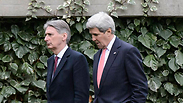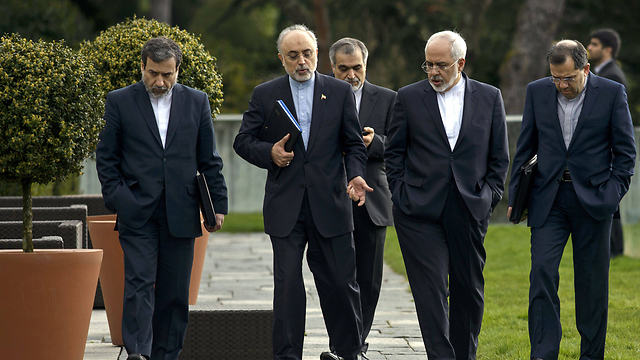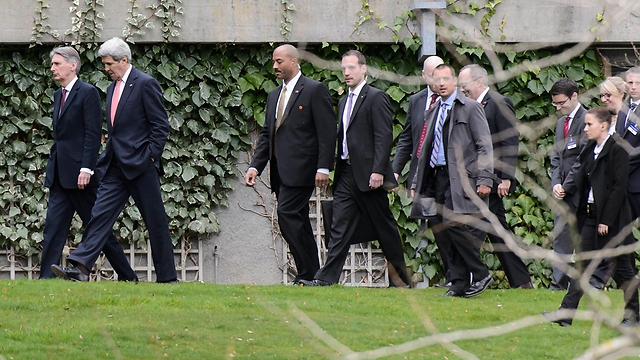
Official: Iran nuclear talks drawing to a close, will continue in new phase
Sides had rushed to complete deal by March 31, despite 'difficult issues'; final statement from Lausanne indicates talks will continue before final June deadline.
Wrapping up six days of marathon nuclear talks with mixed results, Iran and six world powers prepared Tuesday to issue a general statement agreeing to continue negotiations in a new phase aimed at reaching a comprehensive accord by the end of June, officials said Tuesday.
The joint statement is to be accompanied by additional documents that outline more detailed understandings, allowing the sides to claim enough progress has been made thus far to merit a new round, the officials said.
The talks have already been extended twice as part of more than a decade of diplomatic attempts to curb Tehran's nuclear advance, and the next stage will be presented as a new phase, because most of the parties had ruled out another prolongation of this round.
One of the officials said the statement was general in part because differences between the sides remained ahead of a new phase of negotiations toward a comprehensive deal by late June. The second official said other documents will be more technical in nature and will also be made public later in the day.
Russian Foreign Minister Sergey Lavrov was heading back to Lausanne on Tuesday, indicating an end to the talks is near. He had departed Monday but said he would return if a deal was imminent before the self-imposed March 31 deadline for a preliminary deal.
US Secretary of State John Kerry and Iranian counterpart Mohammad Javad Zarif already have been joined by the foreign ministers of the five other nations at the table.
The officials demanded anonymity Tuesday because their information is confidential.
Iran and the six world powers had ramped up the pace of negotiations Tuesday as the deadline stood less than 24 hours away, while both sides warned it was crucial to overcome differences that could wreck an agreement.
For nearly a week the US, Britain, France, Germany, Russia and China have been trying to break an impasse in negotiations aimed at stopping Iran from having the capacity to develop a nuclear bomb, in exchange for an easing of international sanctions that are crippling its economy.
But disagreements on enrichment research and the pace of lifting sanctions threatened to scupper a deal that could end a 12-year standoff between Iran and the West over Tehran's nuclear ambitions and reduce the risk of another Middle East war.
Related articles:
- Exclusive: The Iranians are praying for an agreement
- Alex Fishman / US foreign policy detached from reality
- Smadar Perry / Iran's Mideast master plan
"We need to get this done now," a Western official said condition of anonymity. "We only have a few hours left to get a framework agreement or the job is going to become much, much more difficult."
Officials in the Swiss city of Lausanne said talks on a framework accord, which is intended as a prelude to a comprehensive agreement by the end of June, could yet fall apart. They set the deadline of midnight Tuesday for a framework agreement, but officials from all sides said it was possible the talks could run past the deadline.
"There still remain some difficult issues," Kerry told CNN on Monday. "We are working very hard to work those through. We are working into the night."
Prime Minister Benjamin Netanyahu, who has campaigned against the negotiations, said Monday that the agreement being put together in Lausanne sends the message "that Iran stands to gain by its aggression". He opposes engagement with Iran.
Both Iran and the six have floated compromise proposals but agreement has remained elusive. Western officials said Tehran has recently backed away from proposals it previously indicated it could accept, such as on shipping enriched uranium stocks to Russia.
But a US State Department spokeswoman said there was never a definite agreement on shipping uranium stocks abroad and other options existed to resolve the issue. Officials close to the talks said dilution of the stockpiled uranium was an option.
The goal of the negotiations is to find a way to ensure that for at least the next 10 years Iran is at least one year away from the ability to produce enough fissile material for an atomic weapon. In exchange for temporary limits on its most sensitive atomic activities, Tehran wants an end to sanctions.
"Our feeling is that this is the moment," a Western diplomat close to the talks said. "Either we get a deal or not. Because if we don't come out of this period with some type of framework (agreement) it's going to be difficult to explain why we would get one on June 30."
Iran and the six powers have twice extended their deadline for a long-term agreement after reaching an interim accord in November 2013. They set a goal of securing a framework agreement by the end of March and a comprehensive accord with all technical details settled by June 30.
Assessments from negotiators close to the talks have been swinging between pessimism and optimism since they arrived in Lausanne nearly a week ago. All sides say an agreement is possible but uncertain.
With the US Congress warning it will consider imposing new US sanctions on Iran if there is no agreement this week, there is a sense of urgency in the talks.
"With Congress, the Iranian hawks and a Middle East situation where nobody's exactly getting on, I'm not convinced we'll get a second chance if this fails," the Western diplomat said.
"If we don't have some type of framework agreement now, it will be difficult to explain why we would be able to have one by June 30," he added.
US President Barack Obama has threatened to veto any sanctions moves by the Republican-dominated Congress.
Officials close to the talks said the most difficult sticking points remain the removal of UN sanctions and Iranian demands for the right to unfettered research and development into advanced nuclear centrifuges after the first 10 years of the agreement expires.
The six powers want more than a 10-year suspension of Iran's most sensitive nuclear work. Tehran, which denies it is trying to develop a nuclear weapons capability, demands a swift end to sanctions in exchange for temporary limits on its atomic activities.
Western officials said the two sides had previously been closing in on a preliminary deal that could be summarized in a brief document that may or may not be released.
Iran said the key issue was lifting sanctions quickly.
"There will be no agreement if the sanctions issue cannot be resolved," Majid Takhteravanchi, nuclear negotiator told Iran's Pars news agency. "This issue is very important for us."
Even if a framework deal is reached by the Tuesday deadline, officials say it could still fall apart when the two sides attempt to agree on all the technical details for the comprehensive accord by the end of June.












